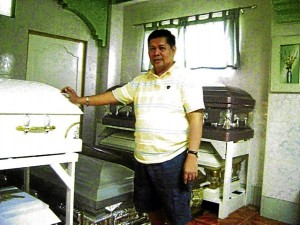Capin Homes: Not a ‘happy’ business but serving a ‘crying’ need
ILIGAN CITY—In 1998, in the wake of the flood that devastated parts of Lanao del Norte, a 30-year-old entrepreneur with a sense of mission provided free funeral service to 38 dead, including those whose bodies were unclaimed.
Last December, when another rampaging storm visited that part of Mindanao, he repeated the feat.
In one such mission, his service car figured in an accident with a military vehicle, where one person died and several others got hurt.
It meant great financial loss and emotional stress for him, but he was unfazed.
The man is Danilo Capin, 41-year-old owner-manager of Capin Funeral Homes in Iligan City, who has early on made it his mission to help the poor.
Aspiring to be an embalmer
As a young worker in one of the biggest funeral parlors in the city, he witnessed how helpless bereaved families were and how they would pawn their property just to give their dead a decent burial.
He was then, only a janitor, carpenter and embalming aide in that funeral home where his father worked for many years.
He never dreamt of putting up his own business, he says. All he wanted then was to be promoted as embalmer. But he needed to be licensed for it.
He raised nine pigs and sold them and with the proceeds left Iligan City for Manila to attend a one-month training in embalming at the San Lazaro Hospital, Department of Health.
After he was trained and then licensed, he went to Aurora, Zamboanga del Sur and worked as full-fledged embalmer for two funeral service firms.
After four years, he took stock of his life. He felt he was not saving enough and not getting anywhere. He found himself back in Lanao del Norte, determined to strike it out on his own, now that he had learned enough of the trade.
Setting up his own shop
He put up Capin Funeral Homes as a single proprietorship in 1995. It began as a two-story, 150-sq m structure in the town of Linamon, rented, with an embalming room upstairs and a ‘chapel’ for wakes and a carpentry shop on the ground floor. He had no vehicle and no funeral lights, so he rented these.
At the outset, he decided to cater to the low-income market—those who can hardly afford the cost of dying.
During the early days, he would sometimes provide service for free just so word would get around there was a low-priced funeral establishment in the area.
To this day, he offers a P2,000—funeral package for the poor consisting of embalming, a coffin, lights, and transport to the place of burial.
To qualify for the service, a family has to be certified by the Department of Social Services and Development (DSSD) as “indigent.”
At surprised reactions at such low-priced package, Capin explains: “I used to construct the coffins myself out of inexpensive lauan wood.”
Growing in business
Only three out of ten people who die are indigent, he says. The rest can afford the regular package of P6,000 upwards. Thus, it evens out for him in the end.
Promotion for him takes the form of making the rounds of the various barangays in the province to introduce his service. He would talk to barangay captains, community leaders and residents.
In almost every barangay, it is traditional among residents to organize what is known as kapunongan sa kasakit (literally “organization for sorrow”) where members contribute a given amount whenever one of their own dies. A kapunongan would typically be composed of 500 to 1000 members contributing P50 to P100 each for every death in the group.
Already, Capin has forged tie-ups with ten such barangay organizations, ensuring a steady market for the business. He offers them a deal hard to turn down—a P20,000 service for half the price.
Tie-up with a politician
A partnership with a lawmaker also proved to be a boon to his business.
In 2000, he was sought out by Rep. Vicente Belmonte—it was agreed that Capin Funeral Homes would provide coffin and embalming services to Belmonte’s constituents for a nominal fee. Low earnings, high volumes made it worthwhile.
It was from this deal with Belmonte that Capin was able to acquire a 1,000 sq m property on Camague Highway, Tubod, Iligan City, where the present Capin Funeral Homes stands.
Capin says he is grateful to the lawmaker not only for promoting his business but more so for helping Iligaynons through various pro-poor projects.
The present Capin Funeral Homes is a two-story building, with five chapels or viewing rooms. Four are private, with family rooms. The fifth is a large common chapel for the poor which can accommodate up to five bodies. The place has seven funeral cars, several computers, an air-conditioned morgue, and an air-conditioned sales office.
Capin employs 22 workers: two embalmers, five drivers, two painters, one secretary, one bookkeeper, one office manager, and five janitors.
The place is yet to be fully completed. “I have written Senators Villar and Legarda for intervention so I can obtain a low-interest loan to complete construction.”
In a few years, he plans to branch out to Cagayan de Oro and Ozamiz cities.
Outlook for the business is good, he says. In June last year, he began a preneed plan jointly with Pioneer Insurance Company. Under the plan, a family pays P350 a year until a member dies to get a P10,000-service plus P10,000 cash for the surviving family.
(This story is among cases to be featured in an upcoming book by the Small Enterprises Research and Development Foundation on “Product Strategies of Small Businesses.” Visit the SERDEF website at www.serdef.org.)















